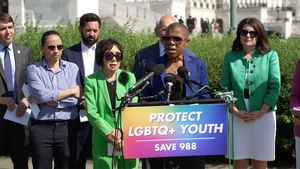Treatment GuideJust DiagnosedSex & DatingAfrican AmericanStigmaAsk the HIV DocPrEP En EspañolNewsVoicesPrint IssueVideoOut 100
CONTACTCAREER OPPORTUNITIESADVERTISE WITH USPRIVACY POLICYPRIVACY PREFERENCESTERMS OF USELEGAL NOTICE
© 2025 Pride Publishing Inc.
All Rights reserved
All Rights reserved
Scroll To Top
By continuing to use our site, you agree to our Privacy Policy and Terms of Use.
With studies estimating that an alarming 50% to 70% of HIVers are regular tobacco smokers'a rate that is two to three times higher than that of the general population'health advocates are bewildered about how to go about reversing this trend. In addition to their obvious concerns about the harms of tobacco use, advocates find such statistics especially troubling because of the myriad additional problems associated with the combination of cigarettes, HIV, and antiretroviral therapy. Smoking can weaken the immune system and increase HIVers' risk of developing thrush, oral candidiasis, hairy leukoplakia, AIDS-related dementia, bacterial pneumonia, emphysema, and pneumocystis pneumonia. Smoking can raise cholesterol levels already elevated by antiretrovirals and multiply the risk of heart disease. Then, of course, there is the potential for developing lung, stomach, and mouth cancer. Notwithstanding 10 years of access to life-extending therapies, many HIVers still carry the antiquated attitude that they might as well smoke, since, they rationalize, they have nothing to lose. This attitude perplexes Christopher Murray, coordinator of the SmokeFree Project at the Lesbian, Gay, Bisexual, and Transgender Community Center in New York City. 'The time has come,' he says, 'when we should stop saying 'Oh, sure, they can smoke' about people with HIV.' But Gal Meyer, medical director at Callen-Lorde Community Health Center in New York City, says such efforts might not be easy to execute. He has been unsuccessful at getting his patients to quit smoking because the issue is not so black-and-white. 'Risk is relative,' he says, speaking of a patient population that is often struggling with mental health or substance abuse issues too. 'A lot of people who have bigger, more immediate threats'and are dealing with those'have trouble putting down the security that smoking gives them.' Because of the pervasive nature of beliefs that keep HIVers from worrying about quitting, any broad-based antismoking movement that would be directed at the HIV-positive population is still in its infancy. There have been only a few ad campaigns geared specifically toward HIV-positive smokers. Perhaps the most successful one was 2003's 'Cigarettes Are My Greatest Enemy,' which ran in local California newspapers with captions such as 'I didn't survive HIV so I could die from lung cancer. I had to stop smoking.' Meanwhile, the California and New York state health departments have developed informational brochures; and groups like the Latino Commission on AIDS have only recently received grant money to develop antismoking programs. Murray was one of the key organizers of a first-of-its-kind conference on HIV and smoking in New York City on November 15 that was sponsored by the New York state health department. A group largely composed of AIDS service organization case managers gathered at Rockefeller University to learn about the harms of tobacco, especially those particularly dangerous to HIVers, and how to develop smoking-cessation strategies for clients. Meanwhile, this year the American Academy of HIV Medicine will add a new chapter about smoking issues to its study guide for HIV treatment physicians. Tony Mills is a West Hollywood, Calif., HIV specialist who argued for smoking's inclusion in the study guide. He said smoking cessation can be successful if physicians have a close relationship with their patients and are persistent about encouraging them to quit. 'I've been amazed over the course of my years in practice how maybe for the first six months, nine months, 12 months, it doesn't really sink in,' Mills says. 'But then they start thinking, Every time I go back there he's going to talk to me about this. Maybe this is important.' Raymond Niaura is a professor of psychiatry at Brown Medical School in Providence, R.I., whose research has found that 70% of New England HIVers smoke. He says, 'Very often I think physicians will find that their patients are actually motivated to quit'or at least willing to try.' In fact, Murray estimates that 70% of HIVers want to quit, the same rate as in the general population. Niaura says doctors need to dispel the pervasive belief among HIVers that smoking is the least of their worries. 'In addition to the positive health benefits, what we see when people quit is that they feel a sense of empowerment that allows them to change other aspects of their life in positive ways,' he says.
From our Sponsors
Most Popular
Lexi Love comes out as HIV+ after Trump deletes federal resources
January 23 2025 11:23 AM
Grindr is reminding us why jockstraps are so sexy and iconic
May 02 2025 5:36 PM
BREAKING NEWS: Trump admin moves to end federal HIV prevention programs
March 18 2025 6:10 PM
Trump's orders prompt CDC to erase HIV resources
January 31 2025 5:29 PM
Celebrating Black History Month with our annual African American issue
February 01 2025 3:28 PM
Tyler TerMeer vows to continue to fight for health care for all
January 28 2025 3:00 PM
Discover the power of Wellness in your life
March 26 2025 12:41 PM
Plus: Featured Video
Latest Stories
Dancer. Healer. Survivor. DéShaun Armbrister is all of the above
July 02 2025 8:23 PM
Two right-wing Supreme Court justices signal they may uphold access to PrEP and more
April 21 2025 4:10 PM
Broadway's best raise over $1 million for LGBTQ+ and HIV causes
April 03 2025 7:15 PM
Plus nominated for 2025 GLAAD Media Award
January 22 2025 12:42 PM
'RuPaul's Drag Race' star Trinity K Bonet quietly comes out trans
December 15 2024 6:27 PM
AIDS Memorial Quilt displayed at White House for the first time
December 02 2024 1:21 PM
BREAKING: Supreme Court rules to save free access to preventive care, including PrEP
June 27 2025 10:32 AM
1985: the year the AIDS crisis finally broke through the silence
June 26 2025 11:24 AM
Trump admin guts $258 million in funding for HIV vaccine research
June 03 2025 3:47 PM
500,000 Children at Risk: PEPFAR Funding Crisis
April 08 2025 3:51 PM
The Talk Season 5 premieres this spring with HIV guidance for the newly diagnosed
March 26 2025 1:00 PM
Jess King is here to help you live your happiest, healthiest life yet
March 24 2025 4:35 PM
A camp for HIV-positive kids is for sale. Here's why its founder is celebrating
January 02 2025 12:21 PM
VIDEO: A man living with HIV discusses his journey to fatherhood
June 10 2025 4:58 PM
HRC holds 'die-in' to protest Trump health care cuts
April 28 2025 2:11 PM
Season 4 of The Switch on resilience & radical self-love returns this spring
March 26 2025 12:20 PM
Gerald Garth is keeping people of color happy and healthy through trying times
March 11 2025 3:38 PM
This long-term HIV survivor says testosterone therapy helped save his life.
December 16 2024 8:00 PM
Ricky Martin delivers showstopping performance for 2024 World AIDS Day
December 05 2024 12:08 PM













































































